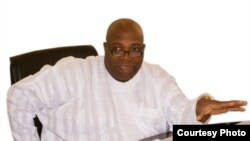An advisor to Nigeria’s President Goodluck Jonathan has denied reports that he named Muhammadu Buhari, the country’s former leader, as a sponsor of the militant group, Boko Haram.
Doyin Okupe, Jonathan’s senior special assistant on public affairs, said the reports were a calculated attempt to hamper the president’s efforts to deal with the security threat posed by Boko Haram.
“There are people who want to damage my reputation and, through me, damage the president and the government,” said Okupe. “These are just some funny and wicked attempts by those who hate the government trying to discredit [us]. There is no iota of truth in it [and] I never said it.”
Reports circulating on social media platforms in Nigeria also quoted Okupe as saying Boko Haram was an “inevitable consequence of the Islamic religion.” But Okupe said the reports were false and an attempt by opponents to cause disaffection in the country by pitting citizens against each other and against the administration.
Abubakar Shekau, the leader of the militant Islamic sect Boko Haram, rejected the idea of any potential amnesty offered by the government. His comments came after religious, political and traditional leaders in northern Nigeria called for granting some kind of amnesty to Boko Haram, and also after President Jonathan formed a committee to discuss a possible deal.
Okupe says the government will continue its work to resolve the security crisis posed by Boko Haram and other groups.
“The government is still very much interested in anything that would bring peace to the country, especially to the areas affected by Boko Haram,” Okupe said. “The options are open and the dialogue and engagement are still continuing at various levels.
“It is our hope and prayer that people with influence will move into this matter and bring the Boko Haram around, so that we can have some peace in this country,” he said.
Some Nigerians have criticized leaders in the country’s north for not doing enough to help stop the violence blamed on the Boko Haram. But, Okupe said the leaders have been helping the government address the threat posed by the militant group.
“After the government has shown some disposition towards amnesty that is largely requested by leaders from the north, there has been a flurry of activities by the northern leaders,” he said. “One is just hoping and praying that all these activities will produce some results that we can all be very happy and glad about.”
“From what I know from the inside,” continued Okupe, “this government has shown commendable capability and has acquired what is required to curtain most of these nefarious activities. The security agencies are getting better by the day, so one cannot but believe that the government is on top of this situation.”
Boko Haram has been accused of carrying out violent attacks in an attempt to force the country to adopt strict Islamic law.
Human Rights Watch says Boko Haram-related violence has killed an estimated 3,000 people since 2009, a toll that includes killings by security forces.
Doyin Okupe, Jonathan’s senior special assistant on public affairs, said the reports were a calculated attempt to hamper the president’s efforts to deal with the security threat posed by Boko Haram.
“There are people who want to damage my reputation and, through me, damage the president and the government,” said Okupe. “These are just some funny and wicked attempts by those who hate the government trying to discredit [us]. There is no iota of truth in it [and] I never said it.”
Reports circulating on social media platforms in Nigeria also quoted Okupe as saying Boko Haram was an “inevitable consequence of the Islamic religion.” But Okupe said the reports were false and an attempt by opponents to cause disaffection in the country by pitting citizens against each other and against the administration.
Abubakar Shekau, the leader of the militant Islamic sect Boko Haram, rejected the idea of any potential amnesty offered by the government. His comments came after religious, political and traditional leaders in northern Nigeria called for granting some kind of amnesty to Boko Haram, and also after President Jonathan formed a committee to discuss a possible deal.
Okupe says the government will continue its work to resolve the security crisis posed by Boko Haram and other groups.
“The government is still very much interested in anything that would bring peace to the country, especially to the areas affected by Boko Haram,” Okupe said. “The options are open and the dialogue and engagement are still continuing at various levels.
“It is our hope and prayer that people with influence will move into this matter and bring the Boko Haram around, so that we can have some peace in this country,” he said.
Some Nigerians have criticized leaders in the country’s north for not doing enough to help stop the violence blamed on the Boko Haram. But, Okupe said the leaders have been helping the government address the threat posed by the militant group.
“After the government has shown some disposition towards amnesty that is largely requested by leaders from the north, there has been a flurry of activities by the northern leaders,” he said. “One is just hoping and praying that all these activities will produce some results that we can all be very happy and glad about.”
“From what I know from the inside,” continued Okupe, “this government has shown commendable capability and has acquired what is required to curtain most of these nefarious activities. The security agencies are getting better by the day, so one cannot but believe that the government is on top of this situation.”
Boko Haram has been accused of carrying out violent attacks in an attempt to force the country to adopt strict Islamic law.
Human Rights Watch says Boko Haram-related violence has killed an estimated 3,000 people since 2009, a toll that includes killings by security forces.





